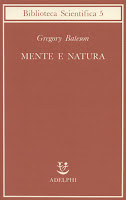Un dieu donne le feu
Pour faire l'enfer;
Un diable, le miel
Pour faire le ciel.
TRACTATUS PARADOXICO-PHILOSOPHICUS
| 11 | Complex: consider paradoxical observers interacting with self-organizing, unpredictable, paradoxical, non-trivial environments that include the observers, thus eluding trivialization. |
| 11.01 | Interaction: any limit between the “distinguished” and its “background” vanishes for one or more of these observers interacting with themselves or socially. |
| 11.1 | Simple: consider logical observers distinguishing non-self-organizing, predictable, logical, trivial environments that exclude the observers, thus embracing trivialization. |
| 11.11 | Distinction: a clear limit between the “distinguished” and its “background”s in social intercourse. |
| 11.2 | Observers cannot trivialize organizationally closed unities. |
| 11.21 | Any attempt to trivialize them will either fail or destroy (loss of organizational closure) the organizationally closed unities (also a failure). |
| 11.3 | Observers cannot trivialize a complex environment without destruction. |
| 12 | Mind: consider the activity of the nervous system that encompasses thinking, perceiving, emotions and feelings. |
| 12.1 | Consider emotions and feelings as the paradoxical activities of closed organizations (that cross and include the sensory and effector surfaces) inside and outside the nervous system of a paradoxical observer. |
| 12.11 | Therefore, emotions and feelings thoroughly escape the logical observer since the logical observer contemplates only inside or outside the nervous system. |
| 12.2 | Just as in the network of oscillators discussed in the Introduction, where external stimuli may drastically reduce the possibilities (number of choices available), so may suitable stimuli applied to the nervous system stunt, in different degrees, its potential for emotional, physical and intellectual expressions. |
| 12.21 | The resulting damage, temporary or permanent, often not obvious and sometimes desirable as in a hierarchical environment, where moderate or no thinking at all constitutes a requisite for membership. |
| 13 | Language-games: imagine predictable and unpredictable games that observers play, logically, inside or outside and, paradoxically, inside and outside their nervous systems, thus defining their forms of life. |
| 13.1 | Meaning: consider the uses that observers give to words in language-games. |
| 13.11 | If the language-games change or vanish, so do the meanings of words used by observers. |
| 13.2 | Language: consider the language-games trivialized (made predictable) by logical observers, where the meanings of words soon evaporate. |
| 13.3 | Explanation: consider the attempts to trivialize a language, e.g., using it only to follow rules while striving for a “logically perfect language”. |
| 13.4 | Communication: consider any attempt to use a trivialized language among observers. |
| 13.5 | Thinking: consider the activities involving the nervous system of a paradoxical observer, including emotions and feelings, and thus offering new language-games to the observer. |
| 13.6 | Conversation: consider the activities involving the thinking of one or more paradoxical observers, thus offering new language-games to these and other observers. |
Tractatus Paradoxico-Philosophicus
A Philosophical Approach to Education
Un Acercamiento Filosófico a la Educación
Une Approche Philosophique à l'Education
Eine Philosophische Annäherung an Bildung
Ricardo B. Uribe
Copyright © by a collaborating group of people including the author, editing consultants, translators, and printers. All rights reserved.Tao Paradoxico-Philosophicus 9-10



















Nessun commento:
Posta un commento